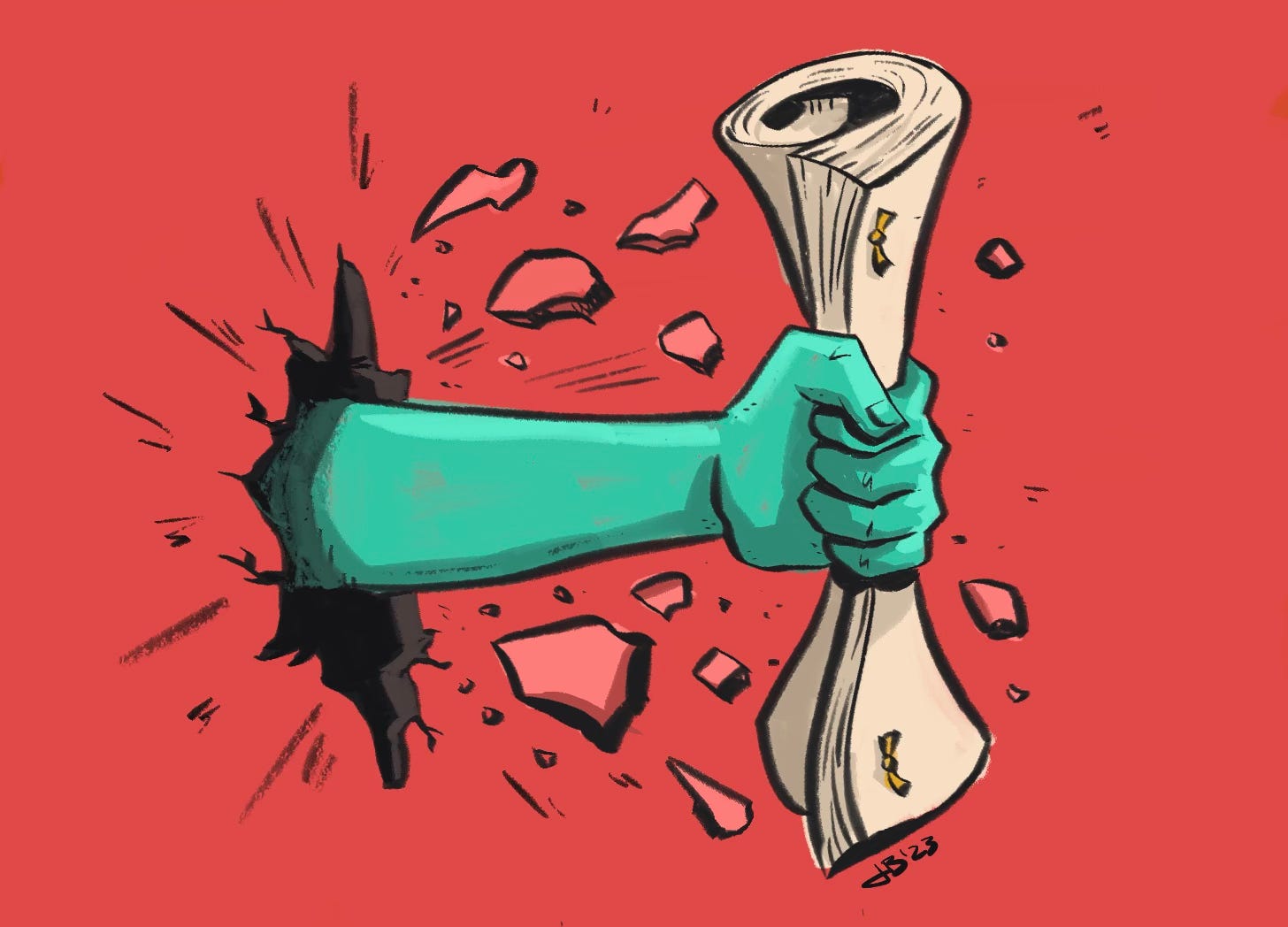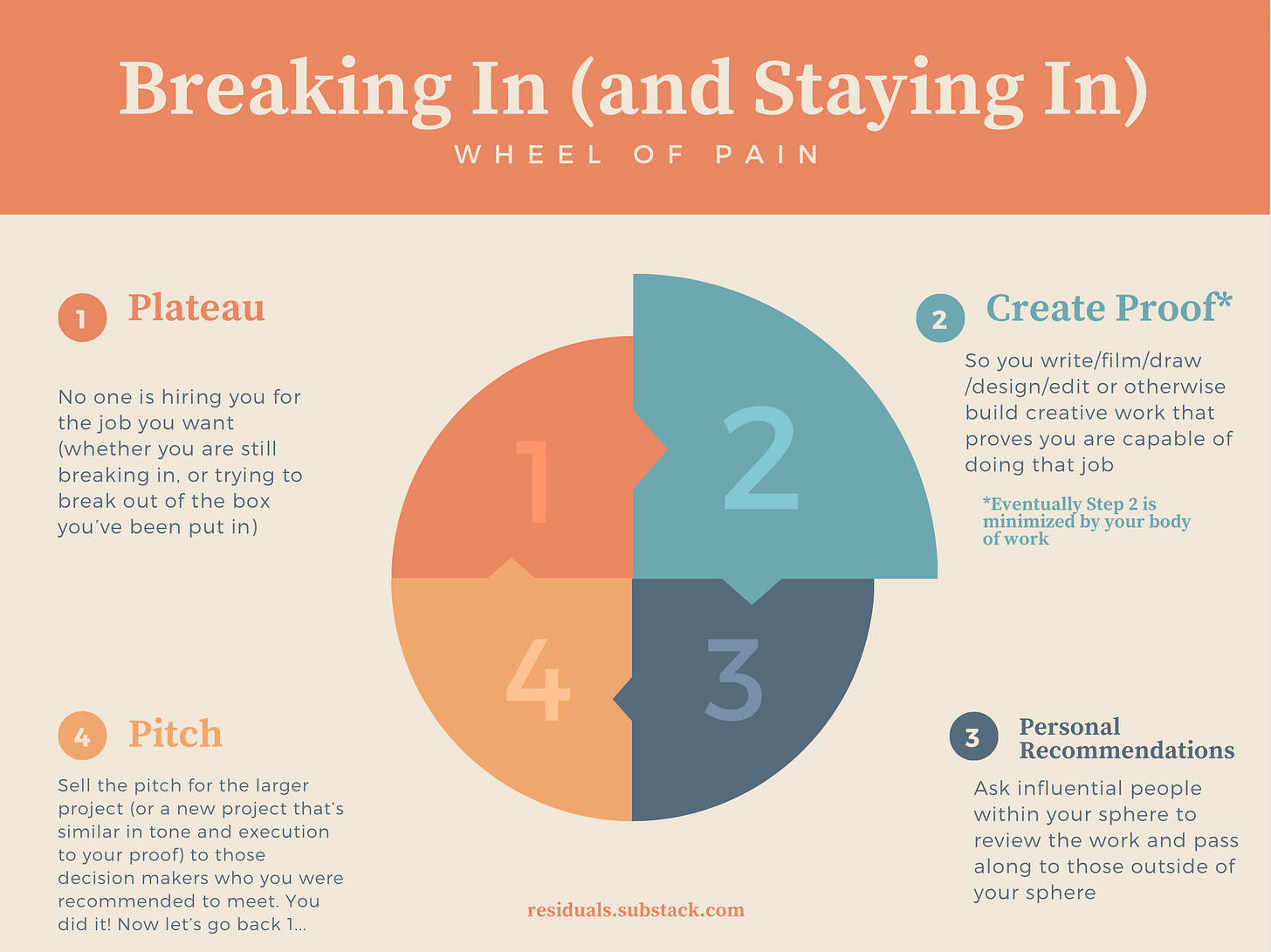The Best Thing You Can Do to Break In (That Most People Never Do)
Breaking In and Staying In #3 - Creating Proof Through Calling Cards

My first jobs in Los Angeles were internships at production companies, working at the bottom of these not-so-well-oiled machines focused on finding new ideas to pair with experienced writers, directors, and talent.
Yes, the ideas could be new, but if you’ve ever tried to get a producer to look at an unproven writer (or have been that writer) then you know it’s a non-starter for all of the reasons we talked about in the first post of this series about breaking in. They want proof that this new idea will work, and they’re already taking a chance on the idea, so everything else needs to be as sure a thing as possible.
So there I was, unproven but trying to make my mark, which is a form of psychological torture for anyone whose been through it.
Until I started making sketches with my friends.
During the day I would read scripts and books and write coverage, roll calls, do lunch and coffee runs, wash cars, truly whatever was asked of me in the hopes that someone might say “Hey, you got spunk, kid! What do you wanna be, a director? Well have I got a shot for you!” (to be read in transatlantic accent).
That never happened and never will happen and it’s insane that there’s a piece of each of us who thinks it could.
But when I started writing, directing, editing, acting, and producing sketches for fun (and for zero dollars), something crazy started to happen: the assistants would watch and get excited about the stuff we were making. They started sharing the videos with their friends, other assistants, and sometimes even their bosses.
We weren’t making these shorts to get jobs, just to have fun on our nights and weekends, but each one ended up serving as a form of proof in itself. Not that I could write a big-budget project or pull off some incredible high-concept premise (one of our shorts was about our friend turning into a puppet, who ended up being a demon) but that we were the kind of people who made things.
We put something out into the world that drew people toward us rather than toward one specific project. We were making fans.
We were accidentally making CALLING CARDS.
Why Do You Need a Calling Card?
If you aren’t on the radar of the people you want to work with, and you can’t reach them yourself, then you need to build roads to reach them. There are Outbound Roads (connections you have through friends and peers - more on that in a later post), but the thing most people don’t create are Inbound Roads, which are ways for these collaborators and decision-makers to find and reach out to you.
This can be a great script (and you definitely should have this already - see last week’s post on the hierarchy of proof for why), but here’s the problem:
Our industry runs on scripts, but many people in this industry don’t want to spend the time it takes to read scripts. Scripts are the necessary proof you need to sell a pitch or get a job writing on a TV series or OWA feature, but they are hard to get in front of people.
That’s why so many of you are probably wondering if you should submit your script to script competitions… where else do you send scripts if you don’t have connections already?
I have more than a few problems with these competitions, mainly because in my second week as an assistant at one of the production companies where I started interning I was asked to represent the company at [BIG NAME PITCH COMPETITION] and when I asked why I was being trusted with the responsibility to choose which pitches to bring to the company, I was told “you’re not going to move forward on any of them. We just go so [COMPANY WHO RUNS COMPETITION] will keep writing good things about us. Just listen and then say we either have something like it already or that it doesn’t fit our mandate.”
I felt like absolute shit listening to pitches that day and realized then that you can pay $50 to enter a competition and still have zero chance of impressing the 21-year-old assistant with two weeks of experience on the other end. Obviously, I never did that again.
Okay, so… fuck… what else do you do?
Instead, Create Your Calling Card (Creating Proof - Part 2)
Think of a calling card as a short, easy to read/watch/digest finished project that you can easily send out into the world as an introduction to the kinds of stories you like to make.
It’s something that either gathers attention OR is where you can direct attention as a way to create INBOUND TRAFFIC toward you and your other work.
They can be short films, sketches, short stories, comics, web series (hello 2010s!), TikToks, hell it could be a cookbook if you want, so long as it doesn’t feel like homework for someone to watch or read.
It needs to be entertaining, to the point, show your point of view, and leave them wanting more.
And that’s the key - if you keep it short, they just may want more, which means they will reach out to you to ask what else you have.
Then BOOM - you hit them with the script that they wouldn’t even look at before.
Now they’re hooked. They’ve been entertained by what you can do without a budget and may want to see what you could do with a budget. Now they are willing to put in the work to read a script or meet up with you to talk about what you’d like to do next.
WAIT! Before you sink all of your savings into a short film —
There’s one last key element to this whole concept that’s worth stressing: making your calling card shouldn’t break the bank, or take all of your time. Actually, it should be something you can make as cheaply and quickly as possible while still reaching a decent level of quality. It doesn’t need to be perfect or flawless with professional audio and video and color and vfx… It just needs to show promise.
Why not put all of your effort into this if it’s going to be your calling card? Because this one short film or sketch or animation or cookbook may not end up being the one that blows doors open.
It may take a few tries. It may take a little time and a small body of work to build up enough attention or reach for people to start sharing or passing to friends. Dropping one thing on YouTube or Instagram or TikTok and waiting for the views to roll in just doesn’t work.
AGAIN: DON’T SPEND ALL OF YOUR MONEY ON THESE
You need to confine production and budget as much as possible so you have the time, energy, and money to keep making more if you’d like. And more importantly, if you don’t like how it turned out, you need to be okay with letting it go and trying something else because if this is the first project you’ve made in a while… you may not love the end product the first time out of the gate.
The reason why most people don’t build calling cards is that too many drop their entire savings and years of work on one project, and when it doesn’t take off they give up on the dream. (Years ago I built an entire film festival/film challenge called Flam Fest to fight against this problem by having a rule that every entry had to be exactly 3 shots. No more, no less. There really is no point in maxing out your credit card to rent an Arri Alexa for 3 shots. Just go make the thing.)
What your calling card is exactly is up to you and your situation. Take some time to think about what resources you have at your disposal. What skills you have that you can bring to the project. What collaborators you think would be willing to help out and join in for free or cheap.
Do you have a camera? Great, maybe you can make a one-location, two actor short film that showcases your dialogue and character work.
Don’t have a camera, but you know someone who does? Maybe you can write the short film and see if they will direct.
Don’t know anyone with a camera, but you can draw? Try a webcomic that’s focused on story and characters rather than art - build a concept around the art you can easily work up a little bit every night after work.
Can’t draw? Team up with an artist who can while you write.
Don’t know anyone creative or have any outlet of your own and it all feels so daunting and overwhelming and there’s just no way you can make anything on your own and what’s the point? Well friends that’s called depression and you should talk to someone and get help, and then dig deeper in your community or those nearby to find the artists and theaters and subcultures where people like you find creative outlets. They exist everywhere, but you may have to do some digging. Then find ways to collaborate.
Don’t worry about perfection, don’t worry about awards or acclaim, don’t worry about views or building a brand - make something you enjoy and care about and put it out into world. Then do it again and again.
You have to build the roads that others can follow back to you because they aren’t going to build them for you. If you put in the work and do it right, that road can find you wherever you live, even outside of LA and NY.
Now it’s your turn. What can you make today, or this weekend, or this month that can be your calling card to bring interest to you? Even if one person finds you through this project, that’s more than you had before, and may be all you need to get to the next step.
Next week:
GATEKEEPERS! Why do they hate you so much and are they really paid just to keep you out? Better yet, how do we turn gatekeepers into your biggest fans and advocates? That’s next week!
Have some thoughts to add? Join the Discord
Thanks for reading! As good as it is in your mailbox, I think the Substack app is the best way to read and catch up on the archive of previous posts. Check out my page on the app/website.
And big thanks to Josh Blake for making an illustration for this series! You can see his work at Gallery 1988 and on his website www.joshsethblake.com




